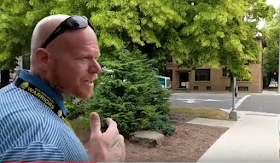By Sarah Owens and Michael Livingston
 |
| Landlord Workshop at Salem Housing Authority |
So, a week after reaching their goal, SHA and partners hosted a workshop for interested landlords, featuring a presentation on the effects of trauma on the brain, and how it affects the process of recovering from homelessness. The purpose of the workshop was to inform, but also to let prospective landlords know that leasing to HRAP clients doesn't mean they have to become social workers, because that's been taken care of, but it does help to understand what their tenants are dealing with.
Readers may have heard Stephen Goins's presentation at a CANDO, or Emergency Housing Network, or Downtown Rotary Club meeting. For most people, it's an eye-opener -- a compassionate but candid description of a process that looks nothing like reaching for stars or happy people hugging. That's because, contrary to what most people might think, recovering from homelessness is terribly difficult. It's difficult for the people in recovery, for the people supporting them, and for the people supporting the people supporting them, which is why landlords typically avoid leasing to anyone recovering from homelessness. Stephen Goins directs Transitional Programs for Northwest Human Services, including HOST and HOAP.
Hear HRAP team members Sonya Ryland (Housing Stability Coordinator) and Pamela Garrick (Grants Coordinator) speak about the program's first year in this podcast interview.
 |
| Cara Kaser Jimmy Jones Jeanine Knight |
At the end of the meeting, the members received an update on its decision to sponsor the Tuesday segment of the community radio show, Willamette Wake Up in 2019. In addition to its regular reports on City Council meetings, the show tended to focus on issues of poverty and homelessness in the mid valley. No one from KMUZ had let CityWatch know the highly-praised program had been canceled just the day before.
Responding to a letter expressing concern over the cancellation, KMUZ defended the decision saying the Tuesday program "no longer serves the interest of the station", but that they would "do our best" to cover "the plight of people without shelter and the solutions to homelessness" without the Tuesday team. (Full disclosure, we were on the Tuesday team.)
In another loss to local coverage of issues relating to poverty and homelessness in the mid valley, Brian Hines is reporting that the Salem Weekly has or will soon be folding. It's not known whether or not publisher A.P. Walther will maintain the Weekly's online edition.
In an October 24, 2018, op-ed, "Why the Marion County Commissioner Races Matter", the Weekly pointed out that "the County has many social service functions in its regular budget that potentially make it a major player in addressing the many near 'crisis level' issues facing our (not strictly urban) community and region", and noted it could have "a significant impact on addressing the homelessness crisis – with which, despite some welcome progress, the City [Salem] is visibly struggling", if those elected to office were to make it a priority.
 |
| Shelaswau Crier and "Roundtable" on Homelessness |
The first two episodes have been aired on CCTV, and are available on VIMEO ("Homeless in Marion County: The Face of Homelessness") and ("Dispelling the Myths of Homelessness"). If the results were modest, the effort was commendable. Hopefully, losing the election will prove to be a minor setback, and the community will be hearing more from Crier in the near future.
For now, however, we should not expect that Marion County will be expanding its homelessness efforts beyond what it is currently doing through its Public Safety Coordinating Council (reentry initiative, MWHI Steering Committee, LEAD, sobering center), Housing Authority, and Public Health division (Hep C and STD testing).
The County recently shared the good news that the LEAD program will be expanding, thanks to grants from the Bureau of Justice Assistance (details at right). If you're unfamiliar with LEAD, you might want to check out the County's very short video explainer, or this two-page FAQs.
If you see the County's LEAD Navigator, Josh Lair around town, you should buy him a cup of coffee and have him tell you about his work. He's a realist who believes in redemption, and he is full of energy and hope. Just the kind of person you'd want to be doing this sort of work.
 |
| Josh Lair, LEAD Navigator for Marion County |
Oregon continues in the top ten nationally for chronic homelessness (6th place), which Jimmy Jones of MWVCAA says "underscores the state’s prevention/diversion priorities haven’t abated high end homelessness" (and aren't likely to in future). It also underscores the importance of supporting programs like HRAP, which was designed by this community and for this community and has proven to be effective in ways no other local program has. It also underscores the importance of reforming the Salem, Marion and Polk CoC, so we can do more programs, like HRAP, that serve those who most need assistance.

No comments:
Post a Comment